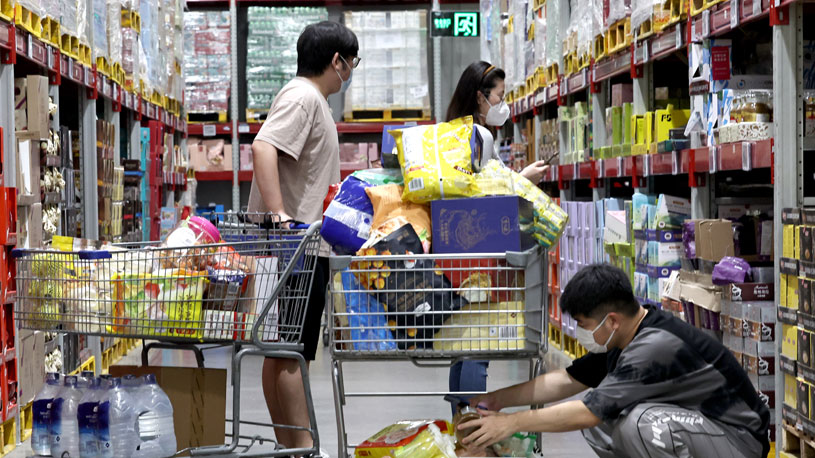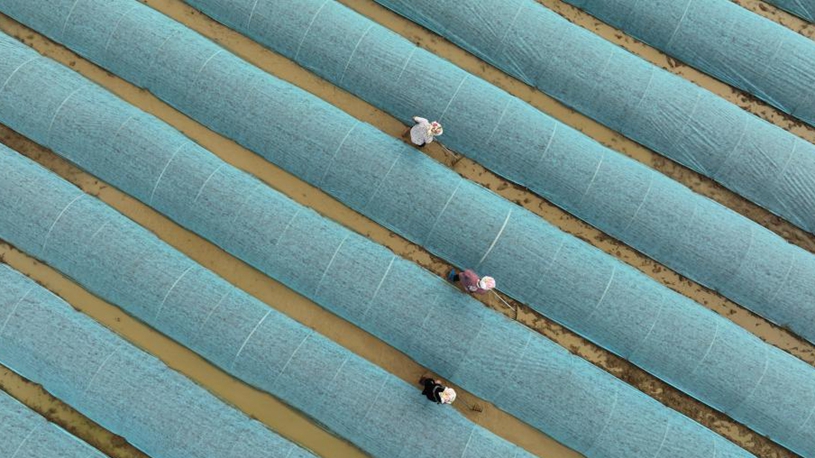* China is showing a great deal of assurance in tackling knotty problems and has managed to strike a fine balance between pandemic response and economic development.
* Many analysts are of one mind that China has adequate policy instruments and conditions to withstand risks and stabilize the market, and will unleash greater potential for further development.
* Despite the epidemic's near-term impact on socio-economic development, what China is doing is reminiscent of the episode in 2020, when it largely overcame the repercussions of COVID-19 by implementing the dynamic zero-COVID policy and became the only major economy to register positive growth.
* At this point, market players are keeping a close link with their Chinese partners and have pinned hopes on China to give a boost to global growth.
BEIJING, May 6 (Xinhua) -- Barely has the world economy recuperated from the past two years of the COVID-19 pandemic, when the Russia-Ukraine conflict, which dramatically disrupted the supply chains of such essential products as gas and grains, has further exacerbated the situation.
Amid a combined impact of various challenges -- including the resurgence of COVID-19, uncertainties in the international arena and risks brought by rising protectionism and de-globalization, in the full glare of worldwide attention is the question as to whether China is able to continue prompting global economic growth?
Though the complexities of the situation seem to cast shadow over the future of the world's second largest economy, China is showing a great deal of assurance in tackling these knotty problems and has managed to strike a fine balance between pandemic response and economic development.
In light of what China has achieved in the past years, economists and China watchers hold that the country, given its remarkable economic resilience and efficient macro-economic policies, will soon get out of the present predicament and add more impetus to global recovery.
OPPORTUNITIES HIDDEN IN CHALLENGES
These days, several Chinese cities, notably the financial hub of Shanghai, were wrestling with the ultra contagious Omicron variant. As the COVID-19 resurgence has partly caused economic slowdown, changes in the geopolitical landscape also pushed China, commonly seen as a locomotive for global growth, to face increasing downward pressure.
However, analysts believe that the problems facing the Chinese economy may turn out to be opportunities. The process of solving them can be taken as a period of adjustment for domestic policy-makers, which will also open a window of opportunities for global investors.

Customers shop at a Sam's Club warehouse store at Beicai Town in Pudong New Area, east China's Shanghai, May 2, 2022. (Xinhua/Chen Jianli)
China has already adopted multi-pronged fiscal measures in tax and fee cuts, public budget expenditure and bond issuance to stabilize the economy and ensure its people's well-being. Moreover, as part of its efforts to promote the dual circulation strategy and high-quality development, it has accelerated the establishment of a unified domestic market, deepened reform and opening-up across the board, and continued innovation-driven development.
In a recent interview with Xinhua, Yu Hong, a senior fellow at the East Asian Institute of the National University of Singapore, said that building a unified domestic market will help China reduce the drag on its economic development.
Meanwhile, Chinese companies are still attractive to investors given their price earnings ratio, said Horst Loechel, an economics professor at the Frankfurt School of Finance and Management. "You have attractive values to invest" under the expectation that temporary hardship will not impede China's economic growth, he added.
In the first quarter, foreign direct investment into the Chinese mainland in actual use expanded 25.6 percent year on year to 379.87 billion yuan (57.5 billion U.S. dollars), according to the Chinese Ministry of Commerce.
Standard Chartered Bank, for instance, feels very optimistic about China's long-term development prospects, according to Jerry Zhang, executive vice chairman and chief executive officer of Standard Chartered Bank (China).
In February, the bank group announced 300 million-dollar-worth investment into China-related business in the next three years, "so as to help our clients seize the opportunities arising from China's continuous reform and opening-up," Zhang told Xinhua in a written interview.
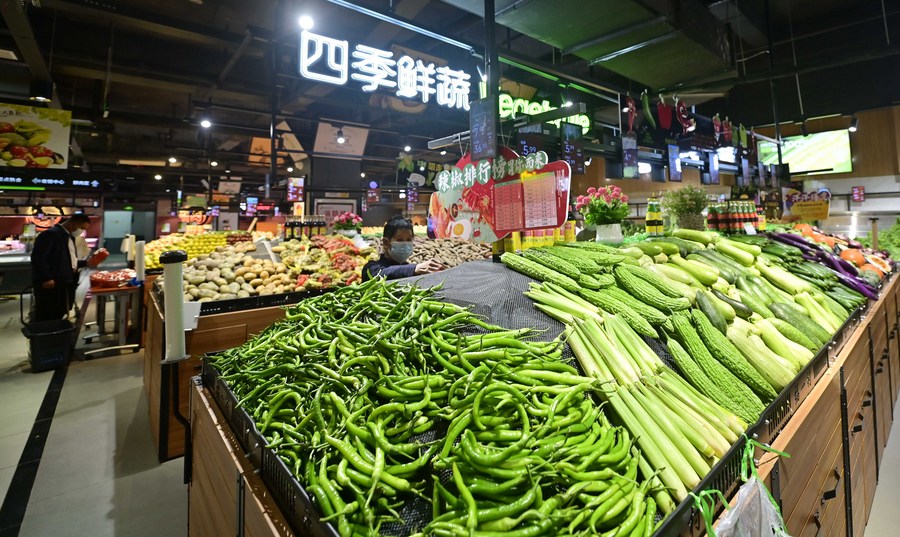
Residents shop for vegetables at a supermarket in Congjiang County, southwest China's Guizhou Province, April 11, 2022. (Photo by Wu Dejun/Xinhua)
SOLID ECONOMIC FUNDAMENTALS
China's GDP grew 4.8 percent year on year in the first quarter, while its inflation growth remains moderate to date, with its consumer price index staying quite low.
The data has reflected the strong resilience and momentum of the Chinese economy, which is based on solid economic fundamentals.
"The more multinationals know about and integrate their operations into the economy of China, the more confidence multinationals will have in China's long-term growth and prosperity," Zhang said, referring to China as the world's largest manufacturer with the most comprehensive and resilient supply chain system, and the second-largest consumer market with huge demands.
"China has been undergoing structural reforms that are focusing on positioning the fundamentals for the changes, transforming the economy from low-end manufacturing to high-end services, to innovation-driven," Director of Nigeria's Center for China Studies Charles Onunaiju told Xinhua.
"Even when such unforeseeable shocks like the pandemic happened, the very strong foundations of these key economic categories were able to absorb it," he added.
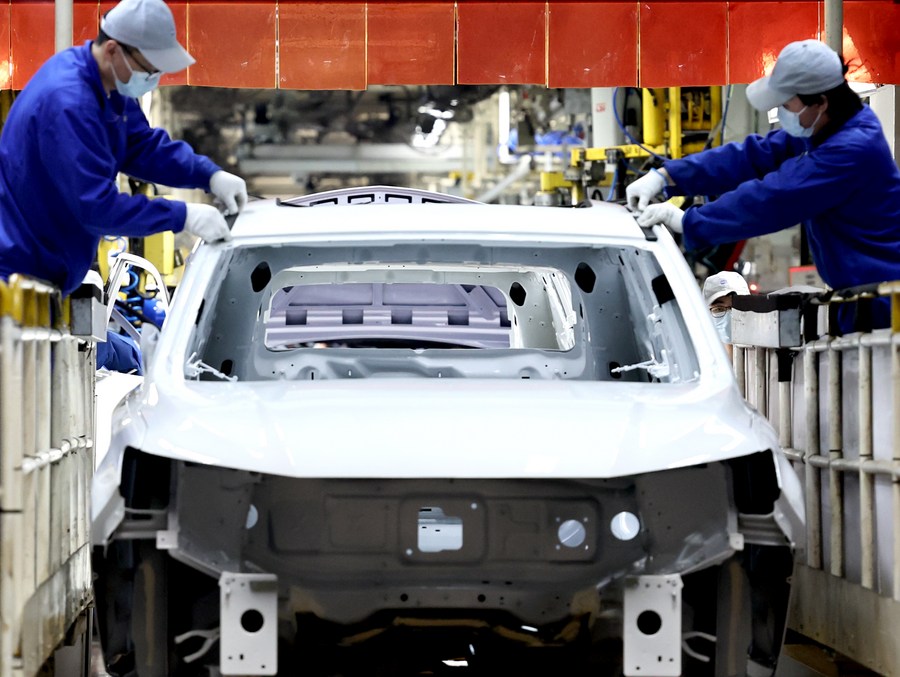
Workers work at the assembly workshop of automaker SAIC Motor Company's Lingang base in Shanghai, east China, April 23, 2022. (Xinhua/Chen Jianli)
Many analysts are of one mind that China has adequate policy instruments and conditions to withstand risks and stabilize the market, and will unleash greater potential for further development.
From the perspective of fixed asset investment, retail sales of consumer goods, and industrial added value, the main factors supporting China's economic growth have recovered better than expected, Fiorenzo Manganiello, co-founder at Lian Group, a specialized direct investment firm in Europe, told Xinhua.
Similarly, Yu, the Singaporean scholar, believes that the factors supporting China's economic growth in the long run haven't altered, and China is still a strong magnet for foreign investment.
Collins Appiah, an economist with Ghana's banking institution Services Integrity Savings and Loans, foresees better performance of China's economy in the second half. "With COVID-19 being managed effectively, it should return the Chinese economy to its strong and robust growth patterns as in the past," he said.

A medical worker takes a swab sample from a citizen for nucleic acid test during a mass testing for COVID-19 in Haidian District, Beijing, capital of China, April 26, 2022. (Xinhua/Ren Chao)
DRIVING GLOBAL GROWTH
Despite the epidemic's near-term impact on socio-economic development, what China is doing is reminiscent of the episode in 2020, when it largely overcame the repercussions of COVID-19 by implementing the dynamic zero-COVID policy and became the only major economy to register positive growth.
At this point, market players are keeping a close link with their Chinese partners and have pinned hopes on China to give a boost to global growth.
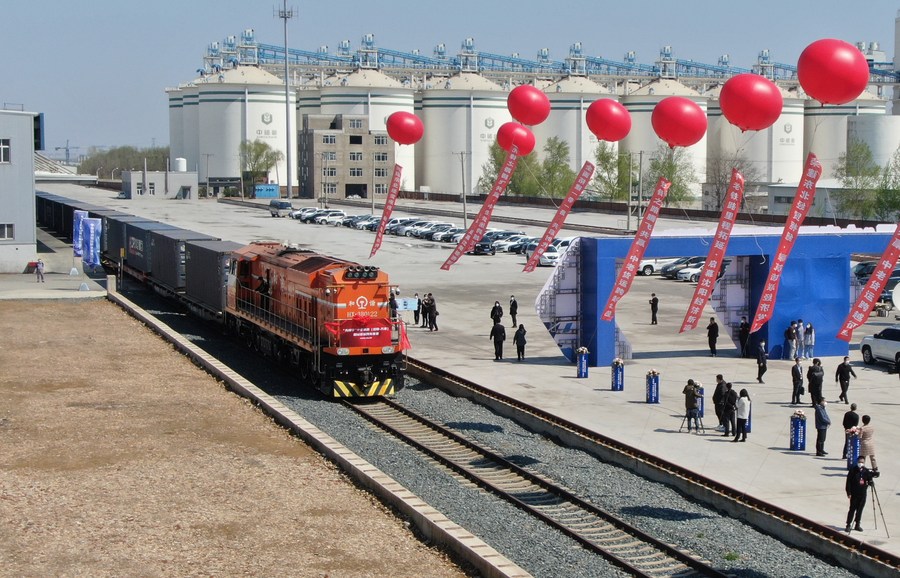
Aerial photo taken on April 22, 2022 shows Liaoning's first international freight train that runs via the China-Laos Railway departing from Shenyang, northeast China's Liaoning Province. (Xinhua/Yang Qing)
China has long been advocating globalization and regional economic integration, proactively engaging in diverse multilateral mechanisms, such as the Belt and Road Initiative (BRI) and the Regional Comprehensive Economic Partnership (RCEP), which Manganiello has called "powerful engines for the recovery of the global economy."
Cavince Adhere, a Kenya-based international relations scholar, said that China carries hopes and aspirations of many countries, and that cooperation with China through such avenues as the BRI is serving "collective interest of all countries."
Wichai Kinchong Choi, senior vice president of Kasikornbank, a leading Thai bank, said that the RCEP is expected to further boost regional growth as a model for multilateral cooperation. Citing Thailand as an example, he said that a sharp increase in exports to China has been one of the few bright spots for Thailand's economy.
Diaa Helmy, secretary general of the Egyptian-Chinese Chamber of Commerce, applauded China's role in "supporting development in Egypt, the Middle East, and the African continent," noting that the mutually beneficial cooperation with China are welcomed in these regions.
Under multilateral frameworks, China is bolstering investment in trade and transport infrastructure for a safe and efficient logistics system, which is set to build up competitive advantages for the country and its global partners.
From January to March this year, China's non-financial outbound direct investment reached 170.95 billion yuan (25.88 billion dollars), up 6.3 percent year on year.
Noting China is continuing supporting the global economy, Sinan Alcin, a Turkish economics and management consultant, expressed confidence that in the upcoming period, China will continue to play a leading role with new road maps in the international arena, not least in areas regarding the BRI and the RCEP. (Video reporter: Luo Hui; Video editors: Luo Hui, Wei Yin, Zhang Yuhong, Cao Ying)■


